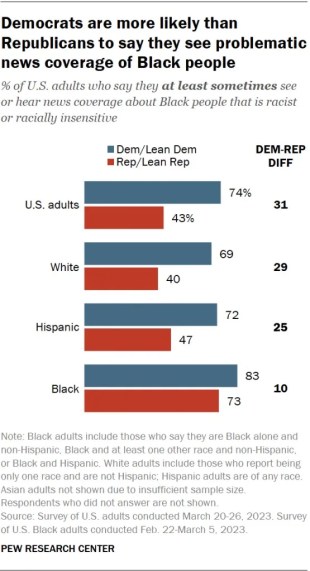☀️ Happy Thursday! The Briefing is your guide to the world of news and information. Sign up here!
In today’s email:
- Top story: OpenAI claims The New York Times’ lawsuit against it is “without merit”
- New from Pew Research Center: Shares who report seeing problematic news coverage of Black people vary by race, ethnicity
- In other news: X suspends multiple journalists’ accounts
- Looking ahead: Meta to limit content that teenagers see on Facebook and Instagram
- Chart of the week: Across racial and ethnic groups, Democrats are more likely to report seeing problematic news coverage of Black people
🔥 Top story
OpenAI said Monday that the lawsuit filed last month by The New York Times is “without merit.” In the suit, The New York Times alleged that OpenAI used its copyrighted material to train ChatGPT and other AI services, while OpenAI says its models are trained with “publicly available materials” as covered by “fair use” protections within copyright law.
While overall newspaper circulation in the United States has been falling for decades, publicly available data suggests substantial increases in digital subscriptions for The New York Times in recent years. The NYT saw a 32% increase in digital-only subscriptions in 2022, surpassing 10 million subscribers and continuing years of growth, according to filings with the U.S. Securities and Exchange Commission.
🚨 New from Pew Research Center
A new Pew Research Center analysis compares Black Americans to other racial and ethnic groups on several questions about news coverage and journalists.
Key findings include:
- Black Americans are more likely than other racial and ethnic groups to say they often see racially problematic coverage of Black people. About four-in-ten Black Americans (39%) report seeing this coverage extremely or fairly often, compared with just 21% of White Americans. About three-in-ten Asian (30%) and Hispanic (27%) adults say they see racist or racially insensitive coverage of Black people this often.
- Black Americans are more likely than other racial and ethnic groups to want their news to come from journalists who share their personal characteristics. For instance, 41% of Black adults say it’s at least somewhat important that they get news from journalists of the same race or ethnicity as them. That compares with just 5% of White Americans, 20% of Asian Americans and 25% of Hispanic Americans.
📌 In other news
- X (formerly known as Twitter) suspends the accounts of multiple journalists, raising censorship concerns
- How independent media outlet navigates Hong Kong’s closing press freedom environment
- Brazilian news outlet Aos Fatos integrates OpenAI API for fact-checking chatbot
- Community news outlets seek to fill voids left by news deserts on Hawaii’s Big Island
- A look into Poland’s ongoing fight to depoliticize state-run media
- Aaron Rodgers removed from ESPN’s ‘Pat McAfee Show’ after suggesting Jimmy Kimmel has links to Jeffrey Epstein
📅 Looking ahead
Meta said on Tuesday that it would move to limit the type of content that teenagers on Instagram and Facebook can see, as pressure mounts from regulators to protect children from potentially harmful content on these platforms.
U.S. parents of teens express a range of concerns about their teens’ social media use, according to a 2022 survey from Pew Research Center. For example, nearly half of parents (46%) say they are extremely or very worried that their teen could be exposed to explicit content, and 29% are highly concerned about their teens being harassed or bullied on social media.
📊 Chart of the week
This week’s chart from our recent blog post shows that Democrats and independents who lean Democratic are more likely than Republicans and GOP leaners to say they see or hear racist or racially insensitive news coverage about Black people, a pattern that persists across racial and ethnic groups. Among White Americans, for example, 69% of Democrats say they see or hear this kind of coverage at least sometimes, compared with 40% of Republicans.

👋 That’s all for this week.
The Briefing is compiled by Pew Research Center staff, including Naomi Forman-Katz, Jacob Liedke, Sarah Naseer, Christopher St. Aubin, Luxuan Wang and Emily Tomasik. It is edited by Katerina Eva Matsa, Michael Lipka and Mark Jurkowitz, and copy edited by Rebecca Leppert.
Do you like this newsletter? Email us at journalism@pewresearch.org or fill out this two-question survey to tell us what you think.